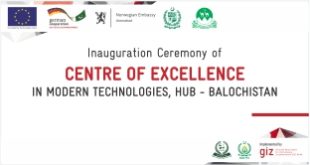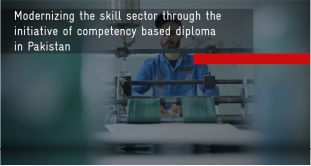TVET Sector Support Programme organized a webinar on Private Sector Engagement: A Way-forward to Decent Economic Opportunities for Skilled Graduates and a Sustainable TVET Eco-System.
Islamabad November 30, 2021: Endorsing the pivotal role of private sector in the country’s sustainable economic development, experts at a webinar have emphasized on the importance of private sector’s inclusion in the TVET sector to ensure productive as well as skilled workforce.
The webinar was organized by the TVET Sector Support Programme (SSP) titled “Private Sector Engagement: A Way-forward to Decent Economic Opportunities for Skilled Graduates and a Sustainable TVET Eco-System” in Islamabad.
The TVET SSP has been commissioned by the German Federal Ministry for Economic Cooperation and Development (BMZ) and is being implemented by the Deutsche Gesellschaft für Internationale Zusammenarbeit (GIZ) GmbH in close collaboration with the National Vocational and Technical Training Commission (NAVTTC), provincial Technical Education and Vocational Training Authorities (TEVTAs) and other private sector organizations.
Purpose of the webinar was to aware masses on the private sector’s participation in technical and vocational education & training (TVET) as an essential for the success of technical and vocational education and training as well as labour market growth.
Omair Abubaker, Private Sector Engagement Expert and National Coordinator, GIZ-Pakistan, moderated the webinar. He discussed about the importance of Public-Private Partnership in TVET sector and technical and vocational trainings for creating opportunities for youth of Pakistan with the panelists.
The speakers highlighted how collaboration of public & private sectors in TVET from designing of curriculum to TVET delivery and workplace-based trainings is indispensable to create economic opportunities for trainees, TVET graduates and to create sustainable socio-economic environment.
Giving expert opinion in the webinar, Chief People Officer, KIA Lucky Motors Corporation, Ashaar Saeed, said that the SSP’s engagement of private sector is the need of the time for ensuring the country’s sustainable development and achieving sustainable eco-system.
He also said the TVET SSP is committed to empower youth of the country, however, it can’t be achieved until industry is involved in the programme and share its role for development.
While speaking about the empowerment that could be attained through skills enhancement, Arshia Ahmed Saqib remarked that seeing rapid entrance of youth in labour market and not getting jobs was very stressful, however, TVET emerged as a turnaround for youth. “When private industry engages with the TVET SSP, this enhances and creates the best career opportunities for the youth,” she asserted.
In her remarks, Head of TVET SSP, GIZ-Pakistan, Iris Cordelia Rotzoll, said inclusion of private sector in TVET is a way forward for decent employment opportunities. “When private sector stakeholders participate in decision-making processes related to TVET sector management, it paves the way for sustainable demand-driven TVET system for economic prosperity of the country,” she argued.
The speakers were of the consensus view that TVET SSP is reshaping the future of our youth by including industry and enhancing work-place based training opportunities for youth to learn on-the-job trainings and compete in labour market.
During the webinar, it was also deliberated how public sector bodies should work in close collaboration with the private sector organizations for the widespread and success of technical and vocational education and training. This engagement with TVET decision making and implementing bodies will generate human capital.
 Pakistan TVET REFORM Support Programme Technical and Vocational Education and Training (TVET) Reform support Programme
Pakistan TVET REFORM Support Programme Technical and Vocational Education and Training (TVET) Reform support Programme








